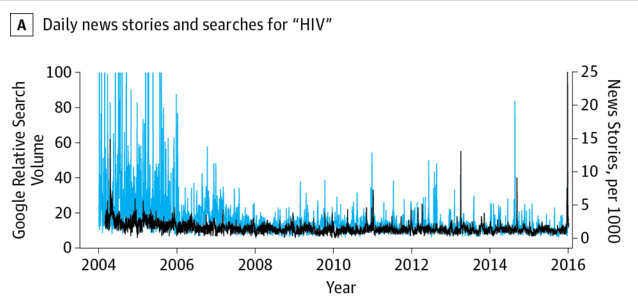Data Science and the “Sheen Effect”
February 23, 2016

At Bloomberg, our data science team develops creative ways to deliver impactful financial information to our customers by creatively interpreting “big data.” Our techniques discover important trends from a diverse array of sources and our efforts and methods have impacts that go far beyond finance.
In a recent effort, our team worked with other leading data scientists to apply Bloomberg algorithms to gauge the public’s response to actor Charlie Sheen’s Nov. 17, 2015 disclosure that he was HIV-positive.
The team wanted to analyze online news and search engine records to determine the impact on public awareness of a public health issue when a celebrity is directly involved or impacted. Could it actually make a difference?
A study on this work, published Feb. 22 by the Journal of the American Medical Association (JAMA) Internal Medicine, found that there were record highs in domestic news coverage of HIV and internet searches for information about HIV and HIV prevention soon after Sheen’s announcement.
By analyzing news data available on the Bloomberg Terminal since 2004, the researchers found that the day of Sheen’s disclosure about his HIV-positive test coincided with a 265% increase in news reports mentioning HIV (97% of which also mentioned Sheen) – even though HIV-related news reports have significantly declined over time. In fact, Sheen’s disclosure places among the top 1% of historic HIV-related media events ever, making his disclosure potentially the most significant domestic HIV prevention event ever.
The coverage – on what the media is dubbing “the Sheen effect” – has been significant, but it turns out so was Sheen’s disclosure.
This is just one example of how our data science team brings creative thinking to the way we approach deciphering data to make it more relevant to our customers and our audiences. To read more about this effort we encourage you to visit the JAMA site and read the paper.

Originally published in JAMA Intern Med., February 22, 2016: News and search trends for all reports or queries each day that included the term HIV (human immunodeficiency virus) since 2004 (news trends in blue and search trends in black).